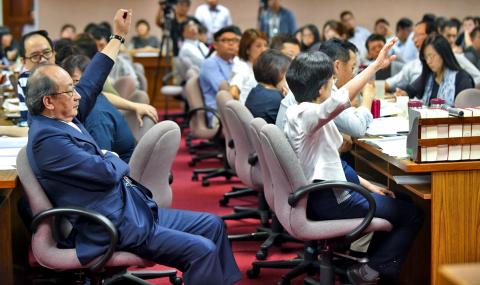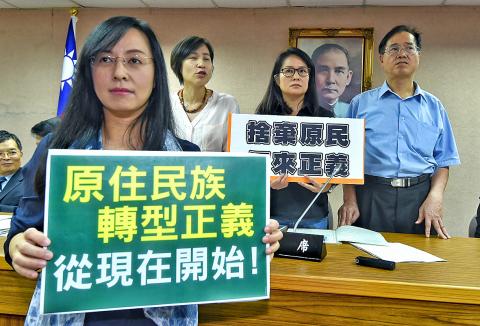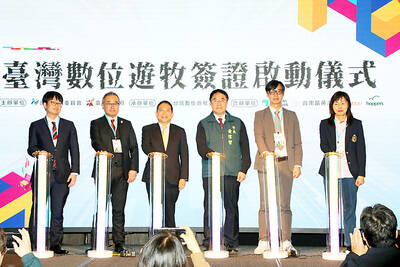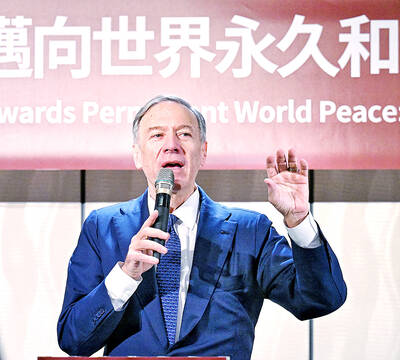Draft legislation for promoting transitional justice yesterday passed out of the legislature’s Judiciary and Organic Laws and Statutes Committee, but after a sharp debate, the final draft left out a proposal covering the restoration of historic Aboriginal rights.
Yesterday was the first day of line-by-line review, which concluded when Chinese Nationalist Party (KMT) legislators walked out of the meeting late in the afternoon after losing votes to expand the scope of the draft legislation to include Aboriginal issues, along with a range of other historic injustices and controversies.
The draft legislation proposed by the Democratic Progressive Party (DPP) caucus focuses on the human-rights abuses perpetrated by the KMT government during the Martial Law era, calls for the establishment of a special committee to investigate abuses and proposes legislation on issues such as opening government files, rectifying unjust verdicts and removing symbols of authoritarianism.

Photo: Liu Hsin-de, Taipei Times
It passed the committee stage with only minor modifications.
Prior to their walkout, KMT committee members had sought to drag out the review with extended procedural remarks criticizing the focus of the draft legislation.
KMT Legislator Lin Wei-chou (林為洲), who serves as one of the committee’s convenors, said that while he could support new investigations into historic human rights abuses, the proposed focus on “justice” was overly subjective.

Photo: Liu Hsin-de, Taipei Times
“If this legislation was just about finding out the truth, I think it would be a lot easier for us to get on track because there would be objective standards to evaluate it,” he said.
“‘Justice’ is subjective and turns this law into a value judgement on a historical period. Evaluating more than 40 years of history is a huge and difficult project. Why does this bill have to pass within just one legislative session,” he said.
KMT caucus whip Lin Te-fu (林德福) called for the scope of the legislation to be expanded to cover the abuse of “comfort women” during Japanese colonial rule.
“Any legislation passed today should be complete, rather than partial and one-sided,” Lin said.
KMT Legislator Lee Yan-hsiu (李彥秀) reiterated the party’s claims that it was unfairly targeted.
“We are not here to stop legislation to promote transitional justice — we are here to stop a version that is full of holes, which is focused on power struggles and settling scores,” Lee said.
Only the DPP caucus’ proposal was presented for committee review, sparking sharp criticism from Aboriginal legislators with the KMT, New Power Party (NPP) and People First Party’s (PFP) for leaving out alternative versions that would have included violations of Aboriginal rights.
Aboriginal DPP Legislator Chen Ying (陳瑩) joined the other Aboriginal lawmakers in briefly occupying the convener’s podium in protest during a break in the review.
“We Aborigines are anxious that if we miss this train, there is no way we can be certain when our turn will come,” Chen said.
DPP caucus whip Ker Chien-ming (柯建銘) said that legislation related to Aboriginal transitional justice issues would still be addressed by the legislature and he criticized the KMT for failing to address the issue during the decades that it was the majority party in the Legislative Yuan.
“The reality is that all the KMT legislators are trying to do today is put obstacles in the way of this law moving forward,” he said.
NPP Legislator Freddy Lim (林昶佐) said that Aboriginal rights and Martial Law era rights abuses could be addressed with separate legislation, but criticized the DPP caucus for putting a low priority on Aboriginal rights.
“Why is it that Aboriginal rights have to wait, instead of human-rights abuses suffered under martial law,” Lim said, calling for a specific timeline to address Aboriginal demands.
“No one dares to say that Aboriginal rights are unimportant, but what has always happened in the past is that they have ended up being treated as unimportant in reality,” he said.
Because Aboriginal rights are so complicated, it makes sense to first address the relatively simple issues [of the Martial Law period],” said DPP Legislator Tuan Yi-kang (段宜康), who chaired the meeting as co-convenor.
“We can move forward on both sets of issues simultaneously, but we will probably need three or four years to address transitional justice for Aborigines, so it does not make any sense to put legislation targeted at the Martial Law era on hold,” he said.
“Aboriginal traditional land covers more than half of Taiwan,” Tuan said. “Addressing ownership is extremely complicated because much of it would be collective property of villages with overlapping claims.”
“There have already been years of investigation and conflict, so there is no way that you can come up with a legal solution quickly,” he said.
The KMT’s call to combine the issue with transitional justice was “insincere,” Tuan said.
“These are different issues from different time periods for different people for different reasons, so you should carefully separate and address them with separate laws,” he said. “Our draft legislation is like a cup: if you try to pour all the water of the sea into it, it will just create a mess.”

ANNOUNCEMENT: People who do not comply with the ban after a spoken warning would be reported to the police, the airport company said on Friday Taoyuan International Airport Corp on Friday announced that riding on vehicles, including scooter-suitcases (also known as “scootcases”), bicycles, scooters and skateboards, is prohibited in the airport’s terminals. Those using such vehicles should manually pull them or place them on luggage trolleys, the company said in a Facebook post. The ban intends to maintain order and protect travelers’ safety, as the airport often sees large crowds of people, it said, adding that it has stepped up publicity for the regulation, and those who do not comply after a spoken warning would be reported to the police. The company yesterday said that

QUIET START: Nearly a week after applications opened, agencies did not announce or promote the program, nor did they explain how it differed from other visitor visas Taiwan has launched a six-month “digital nomad visitor visa” program for foreign nationals from its list of visa-exempt countries who meet financial eligibility criteria and provide proof of work contracts. To apply, foreign nationals must either provide proof that they have obtained a digital nomad visa issued by another country or demonstrate earnings based on age brackets, the Bureau of Consular Affairs said. Applicants aged 20 to 29 must show they earned an annual salary of at least US$20,000 or its equivalent in one of the past two years, while those aged 30 or older must provide proof they earned US$40,000 in

SERIOUS ALLEGATIONS: The suspects formed spy networks and paramilitary groups to kill government officials during a possible Chinese invasion, prosecutors said Prosecutors have indicted seven retired military officers, members of the Rehabilitation Alliance Party, for allegedly obtaining funds from China, and forming paramilitary groups and assassination squads in Taiwan to collaborate with Chinese troops in a possible war. The suspects contravened the National Security Act (國家安全法) by taking photos and drawing maps of key radar stations, missile installations and the American Institute in Taiwan’s headquarters in Taipei, prosecutors said. They allegedly prepared to collaborate with China during a possible invasion of Taiwan, prosecutors said. Retired military officer Chu Hung-i (屈宏義), 62, a Republic of China Army Academy graduate, went to China

UNITY MESSAGE: Rather than focusing on what Trump said on the campaign trail about Taiwan, Taipei should be willing to engage with the US, Pompeo said Taiwan plays a key role in Washington’s model of deterrence against China, former US secretary of state Mike Pompeo said in a speech in Taipei yesterday. During US president-elect Donald Trump’s first term, “we had developed what we believe was a pretty effective model of deterrence against adversaries who wanted to undermine the set of rules and values that the people of Taiwan and the people of the US hold dear,” Pompeo said at a forum organized by the Formosa Republican Association. “Succeeding in continuing to build this model will not solely rest at the feet of president Trump and his team,